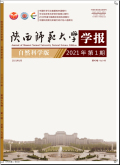陕西师范大学学报(自然科学版)2024,Vol.52Issue(2):8-13,6.DOI:10.15983/j.cnki.jsnu.2024305
旋转超声加工对TiBw网状钛基复合材料表面残余应力的影响
Effect of rotary ultrasonic machining on surface residual stress of TiBw mesh titanium-based composites
摘要
Abstract
In order to study the effect of rotary ultrasonic machining on the residual stress on the material surface under different cutting conditions,the TiB whiskers(TiBw)reticulated titanium matrix composites were selected as the experimental objects,and the surface residual stress of the machined materials was analyzed by rotary ultrasonic machining with nickel-based electroforming diamond grinding wheel.The results show that due to the network structure and excellent high temperature properties of titanium matrix composites,the residual stress caused by cutting heat and microscopic phase transformation is small,while the residual stress caused by abrasive mechanical action is larger.With the introduction of ultrasonic vibration,abrasive particles impact the workpiece surface at high frequency,which makes the residual stress on the workpiece surface of rotary ultrasonic machining greater than that of ordinary grinding.Under the machining parameters of spindle speed n=9 000 r/min,feed speed vf=8 mm/min and machining depth ap=25 μm,a residual compressive stress of-540 MPa exists on the surface of the rotary ultrasonically machined workpiece,and with the increase of spindle speed,the residual stress decreases significantly,and the influence layer depth of residual stress decreases gradually.The introduction of ultrasonic vibration increases the residual compressive stress on the workpiece surface and improves the fatigue resistance of materials.关键词
旋转超声加工/TiBw 网状增强钛基复合材料/残余应力Key words
rotational ultrasonic machining/TiBw mesh-reinforced titanium matrix composites/residual stress分类
通用工业技术引用本文复制引用
董国军,郭志清,代勇,赖睿达,刘荣松..旋转超声加工对TiBw网状钛基复合材料表面残余应力的影响[J].陕西师范大学学报(自然科学版),2024,52(2):8-13,6.基金项目
国家自然科学基金(52075127) (52075127)

